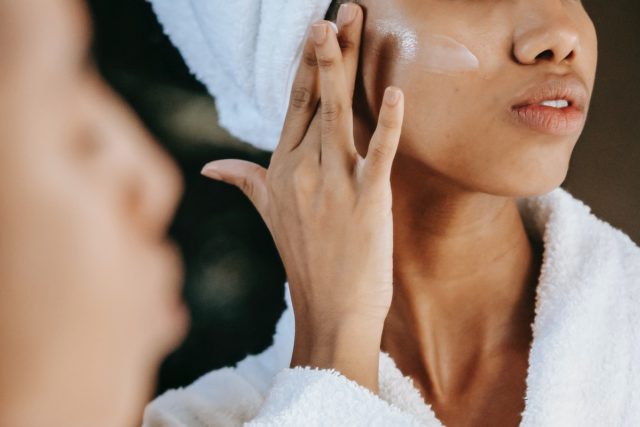Before heading out, you must prepare and protect your skin from the elements of cold, strong winds, and damage. The last step in protecting skin on the face is considering sunscreen, even in extremely cold weather. Pre-protect skin by applying thick, moisturizing creams before getting dressed and going outdoors.
Unfortunately, you need a lot more than slapping on a few moisturisers to keep your skin protected and fight off brutal weather. We must protect our faces to help our skin fight off the effects of cold weather. We should take steps to also protect our faces during the cold weather because this can exacerbate and damage our skin. It is certainly worth taking extra care of your skin during the winter months since the cold weather can cause lots of stress.
Even if you practised good sun safety throughout the summer, it is important to keep being careful with your skin during fall, winter, and spring. If you want to truly make it through the winter with silky-smooth skin, you will have to build up your prevention habits beforehand. Winter can be pretty rough on your skin, so having a pre-emptive skincare routine is crucial. Add some dermatologist-approved steps to your skincare routine to combat seasonal dry, itchy skin.
Schedule a visit to a dermatologist or talk with a cosmetician for instant relief from dry, itchy skin. If you or a family member has skin concerns or wants to schedule a consultation, please contact your Forefront Dermatology in Milwaukee dermatologist near you to make an appointment or to learn more. Establishing a relationship with a board-certified dermatologist is an important step you need to take in keeping your skin healthy, especially if you are suffering from a tearing, painful, or irritating skin condition.
When you have dry, itchy skin, AAD suggests that you discontinue using products containing alcohol and fragrances to help the skin maintain its natural oils. For children, those with sensitive skin, or those who are especially dry, natural oils like coconut or canola are a better choice than lotion.
With naturally moisturized skin, you will need fewer products, and use them less frequently–an effective way to save money and limit your family’s exposure to the complicated mix of ingredients found in commercial body-care products. Protection From The Elements, You will also want to seek out an ingredient that draws moisture out of the air to help moisturize your skin.
Using a humidifier in your home or office will add moisture to dry winter air and help keep skin moisturized. Krant also recommends keeping a humidifier running in the house in the winter — particularly at night because your skin is dryer when you are asleep than it is during the day. Winter forces you to spend more time indoors, and thermostats are turned up, which exposes the skin to dry, forced air both during daytime and nighttime.

The cold winter air has a uniquely low humidity to the point that it sucks the moisture out of the skin. When it is cold, the moisture levels are lower, and this dry air has negative effects on the skin, by creating tension and pulling moisture from the skin, and harsh winds make it even worse. The low temperatures, cold winds, and dry air inside our homes cause more water in our skin to evaporate, and we end up with itchy, dry, even painfully cracked skin, not to mention dry eyes that may even (ironically) rip out. The brutal winter winds and dry indoor heat make this issue even worse, resulting in cracking, and even bleeding, skin.
Your skin is drained from cold and dry weather outside, and inside heat. It is tempting to have a warm shower during the cold weather, but did you know hot water strips moisture from your skin. As tempting as it is to have a steamed, relaxing bath during colder months, bathing often with hot water strips your skin of its natural oils.
While it might be your instinct to jump into steamy, warm showers when it is cold outside, doing so strips the skin of essential moisture. Krant recommends keeping your winter showers short and not as warm, as the warm water eventually strips the skin of its natural beauty. Exfoliation should be done no more than once per week, as excessive exfoliation strips the natural oils from your skin and can disturb the pH balance of the skin, possibly leaving it dryer. You can also avoid Winter Skin Problems by using fewer soaps in general and then limiting the amount you wash to areas that are essential, like your hands, armpits, genitals, and feet.
You should also avoid using excessively hot water when washing your hands–if the water turns red on the skin, it is too hot. Avoid rough clothes, such as wool, because this will break down your skin’s barrier, which keeps moisture in. Since the skin feels dry and sensitive in cold weather, be sure to not wear synthetic clothes, which may irritate the skin even more. When temperatures drop, increase your skincare routine to keep the face, hands, and feet healthy and moisturized.
The best way to keep your face protected against cold weather is by giving skin excellent moisture and protection with a good skincare routine, such as the Napkins Natural Anti-Aging range. Moisturizing is still a crucial part of your skincare routine, but there are plenty of other ways you can boost the natural hydration in your skin and keep your skin from feeling dry, itchy, flaky, and white. Make sure you are using face moisturiser with spf at all times as part of your skincare routine, and look for those with ingredients such as hyaluronic acid and glycerin, which will further moisturize your skin. Our Anti-Age Revitalizing Face Oil is designed for all-year-round usage, but is particularly incredible for your face and neck during colder months, as it helps to replace skin lost moisture which occurs during the winter, while also deeply conditioning dry, scaly, or irritated skin.




WORKOUTS
Healthy Mind
How Pets Boost Emotional Well-being
Healthy Mind
Pursuing Excellence in Healthcare
Healthy Mind
Importance of Patient Safety Awareness
Healthy Mind
Steps to Achieve a Healthier Lifestyle
Healthy Mind
Dos and Don’ts of Gardening
Healthy Mind
A Journey To Inner Beauty
Healthy Mind
Why Do I Need A Bicycle Bag